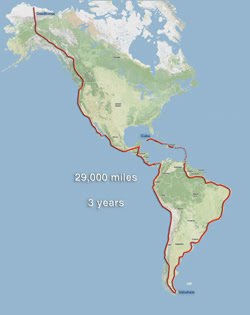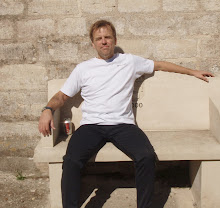Tightly clad in a wetsuit that fitted me last year I raced down to the beach along with my team-mates. This was going to be the 'surfing' section of a 2 day adventure race across the rolling hills of Devon. Actual surfboarding, of course, is an acquired skill so this stage meant simply lying on a board and paddling 100 metres out to a checkpoint and back again. Seems simple enough doesn't it? I dumped my rucksack, picked a nice blue board and made for the surf, cleverly positioning myself further up the beach to allow for the current running left to right. How hard can it be, I thought. This shouldn't take too long.
In knee-high surf I confidently leapt on, settled myself centrally and began to paddle, but not quickly enough to stop the first wave I met dumping me off the board and carrying me straight back onto the beach. A rather self-conscious moment, to say the least as I arrived back at the feet of the marshal who'd wished me luck a minute earlier. I'm sure he wasn't smiling sympathetically but I wasn't going to make eye contact.
Looking around, it seemed that a chest-high surf launch was the norm which was logical but equally problematical in the choppy conditions. I estimated a window of about three or four seconds between waves to pull myself up, get balanced and begin paddling like fury to try and straighten up into the next breaker. My technique, however, took 5 seconds. Several seconds later my board arrived back on the beach once more towing me behind it. The marshal's restraint in offering helpful advice was a gesture I'll always appreciate!
Third time lucky and I'm on the board, paddling and over the first wave. I'm away! In a couple of minutes I'm past the breakers and cresting the swells. Five minutes later I'm exhausted. The brief was to use my arms as though I was swimming, but this is nothing like swimming. It's surprisingly difficult to lift an arm clear of the water to reach forward without immediately unbalancing myself. The effort involved in wrenching my shoulders upwards and forwards while lying dead flat is immense, particularly while simultaneously keeping my head up to see where I'm going and maintaining a vice-like grip on the board with my feet. I'm constantly slipping sideways and having to re-set myself and making very slow progress. Looking back I see I'm only about 50 metres from shore and the buoy is a further 50 away.
At about 70 metres out, I'm completely drained of energy and the litre of sea water I've swallowed hasn't helped. I'm struggling and common sense finally prevails. This might not be the most sensible thing I've attempted. I slowly manage to turn around and try to find the strength to head back for solid land abandoning the points on offer despite my team-mates having made it. About now I really begin to appreciate the strength of the longshore current. What really brings it home is the wave-lashed jagged rocks to my right that appear to be the beaching point on my diagonal course. A butterfly-type stroke helps keep me balanced but this is even more exhausting and I'm beginning to worry about those rocks. I wonder whether getting in the water and swimming normally would be the solution but I don't know whether the board would drag me sideways.
Looking up I see a marshal running down the beach frantically waving at me in a sort of universally recognisable semaphore to move left and paddle very, very quickly. Ah yes, why didn't I think of that? I'm now squarely on route for a dashing on the rocks and will almost certainly need a new wetsuit afterwards.
My best option seems to be reverse paddling in the desperate hope of avoiding the rocks and drifting along to the next cove. Just as I do so, however, my board turns around under me and makes for safe harbour. "G'day mate, having a problem" comes a distinctively Australian voice from behind me. Somehow he manages to defy the laws of physics by pushing me forwards without pushing himself backwards. In the end it only takes a few metres to escape the current and I'm able to paddle slowly ashore just short of the rocks.
I pick up the missed points using a kayak. Safe and stable with great big paddles.
Monday, 12 October 2009
Subscribe to:
Post Comments (Atom)



No comments:
Post a Comment